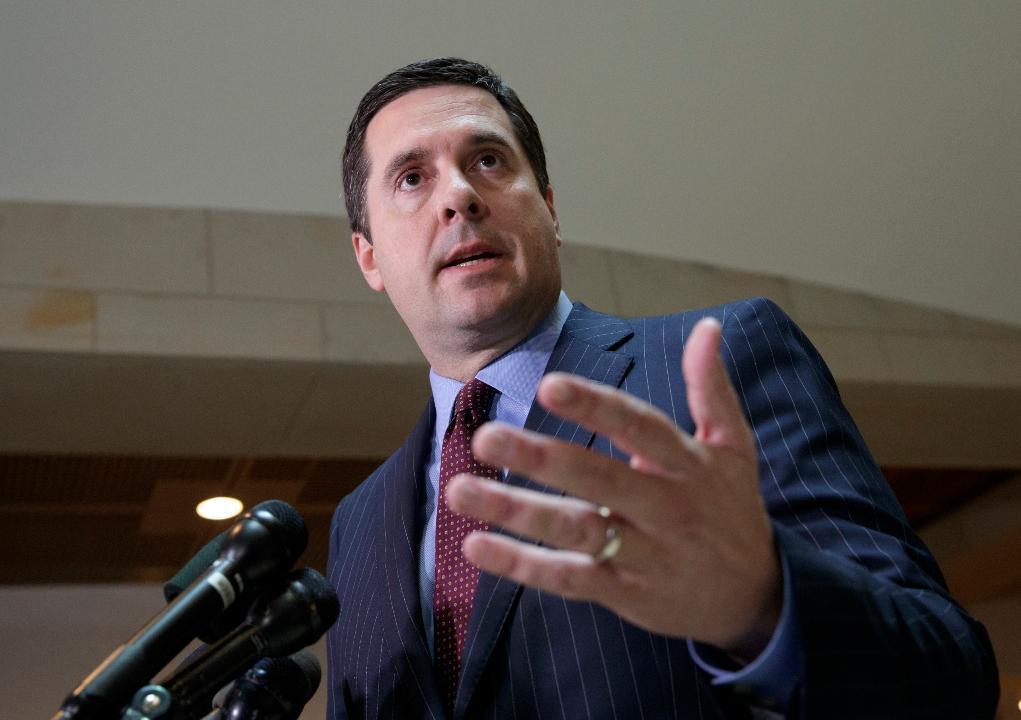Surveillance Findings Raise Concern About Spying on Trump Campaign: Nunes
The Republican chairman of the U.S. House of Representatives intelligence committee said on Wednesday some of President Donald Trump's personal communications may have been caught up in "incidental" surveillance involving a foreign power in the months after the election.
Representative Devin Nunes said the information which he said was obtained from a source he did not identify in any way, was collected legally in November, December and January - from the Nov. 8 election to Trump's Jan. 20 inauguration - but the names of some Trump officials involved had been "unmasked" and the communications widely disseminated within spy agencies.
Democrats and some Republicans have been sparring over Trump posting on Twitter on March 4 that his New York home Trump Tower was "wiretapped" by his predecessor, President Barack Obama. Through a spokesman, Obama denied the accusation.
White House officials, and Republicans including Nunes, have since said that Trump meant general surveillance instead of what Nunes referred to as "physical" wiretapping.
Trump said on Wednesday that he felt "somewhat" vindicated by Nunes' announcement.
Nunes made his announcement at a news conference two days after the director of the Federal Bureau of Investigation, James Comey, confirmed to a hearing of his committee that it was conducting a criminal investigation of potential links between Trump associates and Russia, as Moscow sought to influence the 2016 U.S. election to benefit Trump.
"I recently confirmed that on numerous occasions the intelligence community ... collected information about U.S. citizens involved in the Trump transition," said Nunes, who was a member of Trump's transition team.
"It's all classified information," Nunes told reporters.
The news conference seemed tied to Trump's contention about being "wiretapped" as well as a line of questioning from Republicans during Monday's hearing about the importance of identifying and prosecuting those responsible for intelligence leaks.
Republicans have also focused much of their discussion of the issue on the release of the names, or "unmasking" of Trump associates in the investigation. Trump fired his former national security adviser, General Mike Flynn, after the revelation that he had spoken to Russian Ambassador Sergey Kislyak.
House intelligence committee Democrats said they were not consulted about the information before the news conference.
"I want to be clear, none of this surveillance was related to Russia or the investigation of Russian activities or of the Trump team," Nunes said.
However, Nunes said later he could not be sure that other information existed elsewhere related to Russia.
U.S. intelligence agencies have accused Russia of seeking to influence the presidential election in Trump's favor against Democratic candidate Hillary Clinton by hacking computer systems and spreading disinformation. Russia denies the allegations.
The leaders of the main House investigative committee said separately on Wednesday they had asked the White House and FBI for documents regarding Flynn's foreign contacts with Russia, Turkey and others.
A U.S. government source said it was logical, if not normal, that communications from Trump aides would have been incidentally intercepted by U.S. agencies after his election, given that they would have an interest in talking to foreign governments.
Nunes said he was "very concerned" about whether U.S. intelligence agencies were spying on Trump. He briefed Republican House Speaker Paul Ryan before the news conference and went to the White House to share the information there afterwards.
Nunes held his news conference just before Trump spokesman Sean Spicer gave his daily news briefing at the White House.
Spicer read some of Nunes' statement during the briefing.
"I do think it is a startling revelation, and there's a lot of questions that need to get asked," Spicer said.
Admiral Mike Rogers, the director of the National Security Agency, was asked by Republicans at Monday's hearing about the agency's policies for "unmasking" the names of Americans whose communications were incidentally collected under foreign surveillance programs.
After briefing Trump, Nunes told reporters outside the White House, "I think the president is concerned, and he should be."




















